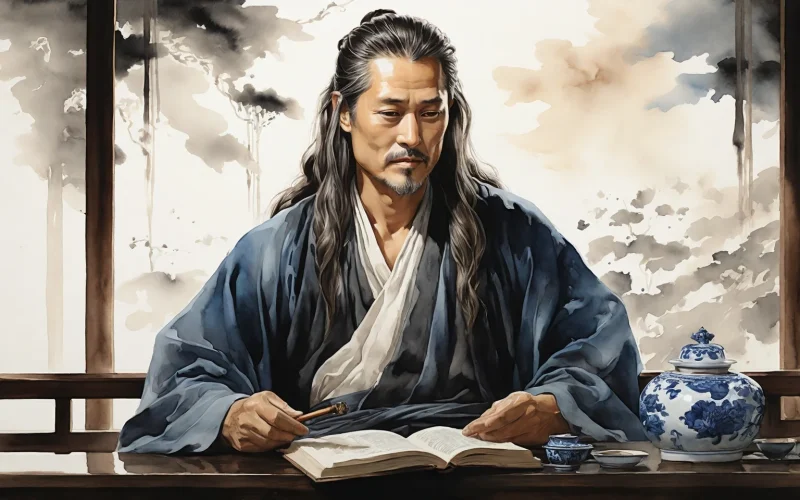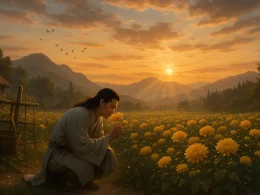Since Boya’s art was lost to time,
His broken strings found none to climb.
Who knew after his highest song,
A strain more rare would come along?
Peaks layering peaks, streams crystal-clear—
Their rival motions crash and veer.
Yet your pure prose needs no outdoors,
All scenes alive behind closed doors.
Mists and snows fill your breast’s hold,
Orchids pile in your lap’s fold.
Moonlight on jade-green pools takes shape,
A Kunlun-jade without escape.
First, you sang ‘Spring Sunlight’ bright—
Dead wood flushed with young buds’ light.
Then ‘White Snow’ chills your tongue—
At once, clouds freeze where notes are flung.
Thus we learn Creation’s source
Contracts, expands at heart’s discourse.
Such writing’s rare; its cleansing power—
Could ink-stained sleeves ever devour?
Let me stitch these words in silk,
To wear close as eternal milk.
Original Poem
「美杨侍御清文见示」
钱起
伯牙道丧来,弦绝无人续。
谁知绝唱后,更有难和曲。
层峰与清流,逸势竞奔蹙。
清文不出户,仿像皆在目。
雾雪看满怀,兰荃坐盈掬。
孤光碧潭月,一片昆仑玉。
初见歌阳春,韶光变枯木。
再见吟白雪,便觉云肃肃。
则知造化源,方寸能展缩。
斯文不易遇,清爽心岂足。
愿言书诸绅,可以为佩服。
Interpretation
This poem was composed during the mid-Tang Dynasty as Qian Qi's inspired response after reading Yang Shiyu's "Pure Prose." The term "Pure Prose" in the title refers to writing that is refreshingly elegant and lofty in style. Deeply impressed by Yang's literary talent, Qian Qi crafted this poem to express his admiration. The verses weave classical allusions with layered imagery to depict the beauty of the text, culminating in praise and earnest hopes—revealing Tang literati's reverence for refined writing and their yearning for kindred artistic spirits.
First Couplet: "伯牙道丧来,弦绝无人续。"
Bó yá dào sàng lái, xián jué wú rén xù.
Since Boya's art perished with him,
His broken zither strings found no successor.
The opening references the legend of "Boya breaking his zither" after losing his musical soulmate Zhong Ziqi, symbolizing the rarity of true connoisseurship and the decline of exquisite literary tradition. Qian uses this to lament the barrenness of refined culture, setting the stage for praising Yang's "Pure Prose."
Second Couplet: "谁知绝唱后,更有难和曲。"
Shéi zhī jué chàng hòu, gèng yǒu nán hè qǔ.
Who knew after that swan song,
A melody yet harder to match would emerge?
Continuing the musical metaphor, the poet compares Yang's work to an "even more unanswerable melody" following Boya's definitive performance—highlighting its extraordinary and peerless quality.
Third Couplet: "层峰与清流,逸势竞奔蹙。"
Céng fēng yǔ qīng liú, yì shì jìng bēn cù.
Like tiered peaks and crystal streams,
Your prose's momentum surges and ebbs.
Landscape imagery illustrates Yang's stylistic dynamism: mountain ranges suggest majestic structure, while flowing water embodies rhythmic vitality—capturing the text's grandeur and fluid precision.
Fourth Couplet: "清文不出户,仿像皆在目。"
Qīng wén bù chū hù, fǎng xiàng jiē zài mù.
Though these pure words never left your chamber,
Their visions manifest vividly before me.
The poet emphasizes how Yang's writing, though physically confined, transcends space through its evocative power—its scenes materializing palpably for the reader.
Fifth Couplet: "雾雪看满怀,兰荃坐盈掬。"
Wù xuě kàn mǎn huái, lán quán zuò yíng jū.
Mist and snow fill my bosom's gaze;
Orchids and herbs brim in my cupped hands.
Ethereal imagery ("mist," "snow") conveys textual purity, while fragrant plants ("orchids," "herbs") embody its lyrical beauty—transforming abstract literary qualities into tangible sensory experiences.
Sixth Couplet: "孤光碧潭月,一片昆仑玉。"
Gū guāng bì tán yuè, yī piàn Kūnlún yù.
Like moonlight on an isolated pool,
Or a single slab of Kunlun jade.
Celestial and mineral metaphors elevate Yang's prose to sublime realms: the moon's solitary glow reflects its clarity, while Kunlun jade signifies its precious rarity.
Seventh Couplet: "初见歌阳春,韶光变枯木。"
Chū jiàn gē yáng chūn, sháo guāng biàn kū mù.
First reading sings spring into being,
Transforming deadwood with radiant light.
The initial encounter with the text feels like spring reviving withered trees—a rebirth of perception through its vitality, echoing the classical "Spring Snow" motif of highbrow artistry.
Eighth Couplet: "再见吟白雪,便觉云肃肃。"
Zài jiàn yín bái xuě, biàn jué yún sù sù.
Re-reading invokes 'White Snow' chants,
Filling clouds with solemn chill.
Deeper engagement reveals wintry refinement ("White Snow" being an erudite song), its austere beauty conjuring an atmosphere of reverent awe.
Ninth Couplet: "则知造化源,方寸能展缩。"
Zé zhī zào huà yuán, fāng cùn néng zhǎn suō.
Thus I learn creation's wellspring
Contracts and expands within the heart.
A philosophical pivot: true art channels cosmic creativity through the human mind's capacity—both expansive and precise—mirroring nature's own artistry.
Tenth Couplet: "斯文不易遇,清爽心岂足。"
Sī wén bù yì yù, qīng shuǎng xīn qǐ zú.
Such prose is rarely encountered—
How could mere refreshment suffice?
The poet stresses the text's exceptional value, insisting its impact transcends fleeting pleasure to warrant enduring contemplation.
Eleventh Couplet: "愿言书诸绅,可以为佩服。"
Yuàn yán shū zhū shēn, kě yǐ wéi pèi fú.
I long to inscribe it on my sash,
Wearing it always as cherished talisman.
The conclusion materializes reverence: desiring to engrave the prose on his garment belt, Qian transforms admiration into ritual devotion—an intimate gesture that underscores the poem's central tribute.
Holistic Appreciation
"Admiring Vice Censor Yang’s Pure Prose" is an elegant and dignified poetic exchange, where Qian Qi expresses heartfelt admiration for his friend's literary work through well-chosen allusions, vivid imagery, and profound reflections. The poem begins with the allusion to Bo Ya breaking his zither, transitions to comparisons of snow, moon, orchids, and jade to describe the writing, then moves into contemplations of "spring snow" and the creative process—each layer deepening the structure and emotional cadence. It not only marvels at the transcendent beauty of these "refined writings" but also reflects the poet's reverence for kindred spirits and the literary art. Rich in rhythmic variation and literary brilliance, this work exemplifies the refined poetic exchanges among Mid-Tang literati.
Artistic Merits
- Natural Allusions, Elegant Prelude: References like "Bo Ya breaking his zither" and "spring snow" thread through the poem, honoring tradition while forging fresh meaning.
- Vivid Metaphors, Uncommon Imagery: Orchids, moonlit jade pools, Kunlun jade, misty snow, and clear streams construct a pristine, lofty aesthetic, suffused with scholarly refinement.
- Harmony of Reason and Emotion, Balance of Motion and Stillness: The poem interweaves dynamism (e.g., "rushing urgency," "handfuls of orchids") with tranquility (e.g., "solitary radiance," "solemn hush"), shifting from praise to meditation in layered progression.
- Tight Structure, Fluid Rhythm: Each couplet advances the thought, building momentum while circling back, making the poem read like both literary critique and lyrical ode.
Insights
This poem teaches us that truly sublime writing is not mere ornamentation but the crystallization of emotion, wisdom, and beauty—born from spiritual insight and harmony with nature. Qian Qi’s poetic tribute to his friend’s work embodies the literati tradition of bonding through literature and understanding through verse. It also reminds us, in an age of haste, to cherish purity and moral integrity in art. Works like these—radiant as "moonlit jade pools" and fragrant as "handfuls of orchids"—are rare treasures in our world.
About the Poet
Qian Qi (钱起, c. 722-780), a native of Huzhou, Zhejiang, was the foremost of the "Ten Talents of the Dali Era" in mid-Tang poetry. His poetic style, inheriting Wang Wei's legacy, excelled particularly in regulated verse (五律), characterized by its ethereal elegance. Yan Yu praised his work as "innovative in form," reflecting the Dali period's transition from the High Tang's naturalism to refined craftsmanship.











